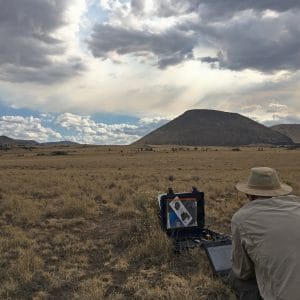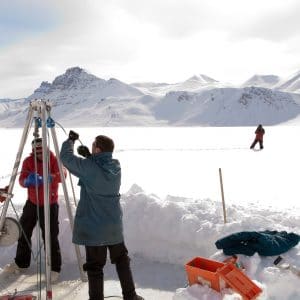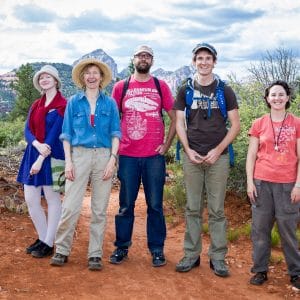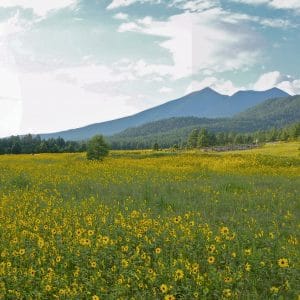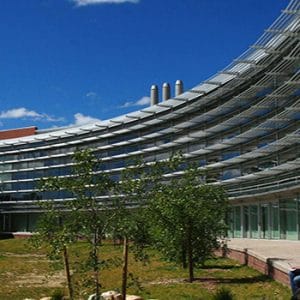School of Earth & Sustainability
See also
- View research project opportunities for new grad students
- Browse past theses
- Resources for current graduate students
- View catalog listing
Diversity and Inclusion
- Find scholarships and community resources specifically to support students from diverse backgrounds
Finding the right grad program for you
- UC Davis list of resources
- UC Davis questions to help you find a good grad school "fit"
- The hidden curriculum of grad school
- Research projects and funding
- Coursework
- Summer plans and funding
- Contact info for current and former grad students
- Opportunities for collaboration
- Life in Flagstaff!
PhD Program in Earth Sciences & Environmental Sustainability
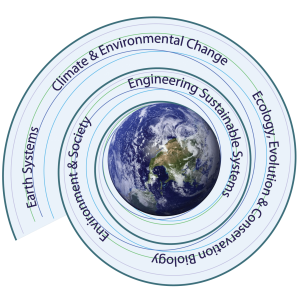 The interdisciplinary Earth Sciences & Environmental Sustainability doctoral program aims to train independent, integrative, and innovative researchers in the areas of earth sciences, climate change, ecology and conservation, social sciences, and engineering. Your graduate education will prepare you for a career in public or private research, and to contribute to a growing industry of leaders, scientists, and engineers addressing issues of climate change, water scarcity, changing biodiversity, natural resource demand, and environmental sustainability in the Southwest, United States, and the global community. Our PhD program offers five emphasis areas, as well as the opportunity to collaborate along common threads of inquiry linking the School’s diverse perspectives on the earth’s past and future. Explore these areas below, learn about our general course requirements, or review the admissions process. Remember, a successful graduate experience depends on finding the right program for you, and also the right advisor – a faculty member who shares and can support your research interests. You should plan to identify one or more potential faculty advisors well in advance of the application deadline, and to have at least one conversation about the match between your interests and opportunities in their lab.
The interdisciplinary Earth Sciences & Environmental Sustainability doctoral program aims to train independent, integrative, and innovative researchers in the areas of earth sciences, climate change, ecology and conservation, social sciences, and engineering. Your graduate education will prepare you for a career in public or private research, and to contribute to a growing industry of leaders, scientists, and engineers addressing issues of climate change, water scarcity, changing biodiversity, natural resource demand, and environmental sustainability in the Southwest, United States, and the global community. Our PhD program offers five emphasis areas, as well as the opportunity to collaborate along common threads of inquiry linking the School’s diverse perspectives on the earth’s past and future. Explore these areas below, learn about our general course requirements, or review the admissions process. Remember, a successful graduate experience depends on finding the right program for you, and also the right advisor – a faculty member who shares and can support your research interests. You should plan to identify one or more potential faculty advisors well in advance of the application deadline, and to have at least one conversation about the match between your interests and opportunities in their lab.
Emphasis areas
Earth Systems | Climate & Environmental Change | Ecology, Evolution & Conservation Biology | Environment & Society | Engineering Sustainable Systems
Earth Systems
Courses Accordion Closed
Graduate-level courses with GLG prefix, or other courses that focus on earth systems
This emphasis will prepare you to pursue research and educational opportunities that:
- advance cutting-edge research in the Earth sciences
- increase knowledge in the critical areas for society of energy, natural resources, water, and natural hazards
- apply this knowledge in areas that bridge the geosciences with physics, chemistry, engineering, and biology
This emphasis area will train and educate leaders in rapidly growing industries and academic fields such as natural resources and energy, and in government agencies that require PhD-level researchers to inform policy decisions on some of the greatest problems facing society.
Climate & Environmental Change
Courses Accordion Closed
Graduate-level courses with EES, ENV, BIO, or FOR prefixes, or other courses that focus on climate or environmental change
This emphasis will prepare you to pursue research and educational opportunities that:
- advance new understandings of natural climate variability
- improve projections of climate change and its impacts on ecosystems and their ecological, hydrological and geological underpinnings
- inform policy decisions about how best to manage natural resources under changing climate and related environmental stresses.
This emphasis often combines the long-term perspective from geological archives with process-oriented investigations of today, with the goal of integrating a field-based understanding of natural systems into predictive models to support sustainable resource management in the face of climate change.
Ecology, Evolution & Conservation Biology
Courses Accordion Closed
Graduate-level courses with EES, ENV, BIO, or FOR prefixes, or other courses that focus on ecology, evolution, and conservation
This emphasis will prepare you to pursue research and educational opportunities that:
- advance the frontiers of understanding of ecological and evolutionary processes
- synthesize applied, empirical, or experimental work from multiple disciplines to confront integrative challenges at the cutting edge of applied and basic research
- apply ecological, evolutionary, and conservation theory to conservation challenges, incorporating the human dimensions of sustainable management and policy
This emphasis will train and educate leaders in areas of research and application at the cutting edge of conservation and sustainability professions, including basic research, management decision-making, sustainable policy development, and applied conservation.
Environment & Society
Courses Accordion Closed
Graduate-level courses with EES and ENV prefixes, and other courses that focus on environmental policy
This emphasis will prepare you to pursue research and educational opportunities that:
- advance knowledge in social theory and environmental policy related to sustainability
- conduct cutting-edge interdisciplinary research at the nexus of the natural and social sciences
- apply this knowledge in decision making for sustainable resource management and socio-economic policies
This emphasis will prepare leaders in the areas of natural resources management, community engagement, the non-profit/NGO sector, academia, and in government agencies that require PhD-level researchers to inform management and policy decisions that address some of the greatest environmental problems facing society today.
Engineering Sustainable Systems
Courses Accordion Closed
Graduate-level courses with CENE or ME prefixes, or other courses that focus on engineering sustainable systems
This emphasis will prepare you to pursue research and educational opportunities that:
- advance engineering analysis and applications relevant to sustainable development
- improve the efficiency and effectiveness of engineering processes, products, and education
- understand and apply knowledge in the sustainability contexts of economic viability, environmental compatibility and sustainability, societal impacts and policy development and implications
This emphasis is designed for engineers who are interested in understanding the economic, societal and environmental implications of engineering systems. It provides a strong background in engineering enhanced by understanding future sustainability of our environment, and will prepare you for careers in academia, industry, and governmental organizations.
Requirements for all emphases
- ENV 555: Environmental Science/Policy Interface
- EES 605: Regional Topics in Earth and Environmental Science and Policy
- EES 606: Research Methods in Earth and Environmental Science
- Professional experience: Any experience that significantly broadens knowledge and skills, and advances your career objectives (6 units).
- 2 seminar courses (698) selected by student and committee
- 15 units of EES 799 for the research, writing, and oral defense of an approved dissertation
- Comprehensive exam
- Courses specific to an area of emphasis and dissertation topic, with at least 6 units in the area of emphasis chosen with approval of the student’s dissertation committee (30 units, with up to 24 units transferred in from other graduate course work).
How to apply
First, get to know our faculty and review current opportunities for students. It is very important that you reach out to faculty members you would be interested in working with before you apply. Faculty expect to receive emails from prospective students. To get the best response, be as specific as possible about why you are interested in their research or their lab (reading one or more papers from the lab is a great place to start!), and what you are hoping to get out of grad school. They can then tell you more about their research and if they have space available in their labs.
Second, entry into any SES Graduate Program requires an online application through the Graduate College.
A completed application for admission will include:
- An online application for admission to the NAU Graduate College, with the required application fee;
- A statement of your interests and goals, and your reasons for pursuing an advanced degree;
- Unofficial transcripts of all undergraduate and graduate course work;
- Names of the faculty advisor(s) you have been in contact with and would like to work with;
- Three letters of recommendation from academic or professional supervisors (you will only have to provide contact information, and then recommenders will submit letters directly to NAU. Give them time to submit before the deadline);
- Submission by the January 1st application deadline.
Funding your graduate education
Graduate students in this program are supported via Research Assistantships (funded by grants obtained by individual faculty within the School), and/or Teaching Assistantships. Both RA and TA positions for PhD students at NAU include a yearly stipend of $20,000 to $27,000 (depending on the availability of summer support) plus funding for tuition and health insurance. The Presidential Fellowship Program at NAU provides additional funding for top applicants to increase the annual stipend, and does involve a separate application, submitted in collaboration with your potential faculty advisor. Decisions about RA/TA support are made together with admission – there is no separate application process required. Talk to your potential faculty advisor about funding availability, including summer support.
Once students are in the program, there are also scholarships and fellowships available to cover some research costs, student fees, and/or stipend supplements.
